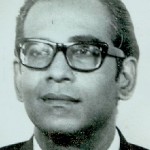Sunday Times 2
A physiologist with public interest at heart
In 1968, at age of 39, Kirthi Nissanka Seneviratne became Professor of Physiology in the Colombo Medical School founded in 1870, one of the oldest in Asia.
If, as Alexander Pope said, “the proper study of mankind is Man,” then physiology is the main subject to study. What makes Man and (Woman) tick? Physiologist can claim to know best. Alfred Nobel realised the importance of physiology and one of the five prizes he instituted was for physiology or medicine. Historically, many more physiologists than medics (who have cleverly exploited the discoveries of physiologists to treat their patients profitably) have won the Nobel Prize for physiology or Medicine. What successful medics envy is certainly not the money that comes with a Nobel Prize. They legitimately make enough money not to envy the glory of physiologist.

Prof. K.N. Seneviratne
Brilliant KNS
In his brilliant undergraduate career, KNS earned distinctions in physiology and medicine and deliberately chose to be a physiologist instead of a physician. Legendary Senaka Bibile (founder of the patient-friendly State Pharmaceuticals Corporation) who won gold medals for medicine and surgery in the final MBBS examination in 1945, also chose to become an (unglorious) pharmacologist instead of a physician or surgeon with a huge earning potential. Some 37 years after Prof. Senaka Bibile’s untimely death in 1977, a grateful public still venerates his memory. Why?Because, above all, he served the public interest. He worked tirelessly to make safe, effective, quality drugs available to ordinary people at a reasonable price. For his part, Prof. KNS, aside from excelling in his field of specialisation (diabetic neuropathy) found time to pioneer the establishment of the Post-graduate Institute of Medicine. The PGIM presides over the onerous task of training our medical specialists. That the service he rendered in this area is not sufficiently appreciated and is little known is another matter. Not that KNS cared a jot for such things. He just did his duty by his country and his people.
Premature death
When nicotine-enslaved KNS – popularly called “Bull” by his numerous friends – was felled by a massive heart attack at the age of 57, Sri Lanka prematurely lost its most distinguished physiologist (without the murderous tobacco industry even hanging its head in shame.) For my part, I lost my best friend in the Physiology Department. From 1957 to 1981, KNS bestrode the Physiology Department like a colossus. He was a magnificent specimen of a man with a magnetic personality and a slightly husky lecturing voice. He was powerfully built and moved with the majestic dignity of physically towering personalities. He lectured without notes. Female medical students adored him and it was his unfailing kindness and courtesy to me that prevented my heart from bursting with envy. To tell the truth, I began to walk tall (at 5 foot 4) in the Physiology Department only after Bull left it to join the WHO in 1981. For 27 unbroken years after his death physiologists have remembered him and honoured him with an annual oration.
The orator
This year’s Prof. K.N. Seneviratne Memorial Oration will be delivered by Dr. Kemal Deen, Professor of Surgery in the University of Kelaniya Medical School. He is a smart young man in whose glory I openly bask on the ground that I decisively influenced his recruitment and postgraduate training. The subject of his oration is an imposing one: “Gracilis Muscle as a Neo-sphincter – Exploiting Physiology.” In plain English this means that he is using a muscle in the thigh called the Gracilis Muscle to try and prevent the involuntary escape of waste material from the bottom end of the digestive tract of unfortunate patients.
The Gracilis Muscle is under voluntary control and when suitably arranged by surgical skill can be used to perform a function for which it was not made by nature. Prof. Kemal Deen is a marvellous lecturer and those who care to turn up to listen to him at the Sri Lanka Medical Association Auditorium, No. 6, Wijerama Road, Colombo 7, on the 21st of November 2014 at 6.30 p.m. are sure to be engagingly enlightened. All are welcome.
Prof. Carlo Fonseka

